05/05/2023
Chapter 15
A chat with...Phil & Simon Thompson (Thompson Bros/Dornoch Distillery) - #11
I had already (briefly) mentioned Phil and Simon Thompson in my Chapter 4 to talk about their amazing labels and graphic efforts.
However, this time, we will focus on what they actually are able to deliver in terms of whisky.
They currently represent both the independent bottling market (as Thompson Bros.) and the distilling world (as Dornoch Distillery), by successfully, in my opinion, keeping up both the activities.
We had the pleasure to ask them some questions about both their present and past extensive whisky experiences.
Let’s see what they told us…
Photo courtesy of Marcel Van Gils
Hi Phil and Simon, thank you for taking the time to chat with us. Please introduce yourselves, and tell us a little bit about your whisky journey so far.
ST: Hi, Simon Thompson, general whisky generalist. Becoming master of one or two things in distilling and yeah…it’s keeping us entertained, off-the streets, busy messing around with whisky production, independent bottling, import, exports…A general Whisky Human.
PT: Phil, another general Whisky Human, we run the distillery together. We’re a team of seven in total in this pretty small distillery.
When and how did you join this growing industry?
PH: We are from hospitality background. Our family owned an hotel in Dornoch it will be 23 years this year, the Dornoch Castle hotel (see side mention). We worked in the bar when we were quite young age. Through necessity we were learning about what we had available there to us. After studies I came back saying “I’ll be back for a couple of months to help out”.
When I came back from studies, Simon was buying all the whisky for the bar, subconsciously collecting stuff. From there we got a little bit obsessed about opening older bottles. It was 2005-2006 there was a lot of good accessible bottlings from Gordon McPhail, Brora, Rosebank, Port Ellen. These things were still available and we ordered them for the bar.
ST: Yeah and cheap. By today’s standards relatively cheap. I still remember in 2006-2007, the most expensive whisky in the bar was a 50 yo Glen Grant, which we could afford and put in the bar for £15.
PT: We realised that a lot of people were coming to the hotel for the whisky. And we started to meet a lot of people including a lot of European collectors, connoisseurs. We made a lot of good friends, and a lot of contacts. And it was some glorious years of stuff we could make available in the bar at accessible prices and still make a margin.
ST: If something wasn’t in a good condition we would discount it and shift it to the front of the bar to sell it quickly to ensure quality. And we’re still carrying this philosophy today in the bar, but of course finding the bottles now is difficult. These days very little gets overlooked so getting good bottles at reasonable prices is hard.
Photo courtesy of Marcel Van Gils
Now tell us a bit more about Thompson Bros and Dornoch Distillery, what is it that makes them stand out in the whisky industry?
ST: Dornoch distillery is one of smallest and worst distillery in Scotland by any performance metric. It’s the lowest yield, lowest efficiency, highest cost to run. So yes, it’s an awful distillery. But a lot of the things we do are sacrifices in the exchange for flavour.
We embrace inefficiency for flavour, because there is a clear balance between yield and flavour creation. And the whole idea of the distillery was to reverse engineer old style production principles. We don’t use any modern barley variety for example. Not every single aspect old style production, but we clearly identified the few critical factors to make that flavour profile. So for example our stills are directly “electric fired” although we initially started as directly gas fired . This gives us a very similar concentration in the heat profile which creates that nice Maillard reaction (see Wikipedia). And the juices are looking very good in there so we’re quite happy with what we do and we let the people to judge how we compare with older style whiskies.
In the old days we used to run blind tasting. With ten Speyside whiskies in front of you you could really spot the differences. Today it’s a bit harder but with Dornoch, you can always pick it up from the crowd.
Photo courtesy of Marcel Van Gils
Can you tell us what Thompson Bros' and Dornoch Distillery's target audience is?
ST: For us fundamentally whisky consumers, whisky people. We want us to be accessible to people for those to are going to open and share our bottles. I want our whisky to be as accessible as we can possibly make it. Of course we’re restricted on the volume we can put out.
It’s difficult as you can’t give everyone everything that they want when they want it at the price they want (going back to our hospitality background this is what we’re from).
PT: The true enthusiasts. We try to keep it at a price that people can open our bottles. Of course we still need to run as a business, but we try to keep our price accessible to our consumers.
It’s quite an interesting time for Whisky. Customers are starting to talk with their wallets and potentially shifting away from independent bottlers. I just feel price of casks are insane now and not sustainable with people’s wallets.
Some of the big bottlers will be looking at what they have sitting there and the price to replenish it… So going back to our primary customers these are people who genuinely care about Whisky, we want to make it accessible to them, but the market is making very difficult to do so… and it’s not independent bottlers that are making it difficult…
Can you tell us how you select your casks, and anticipate anything about what we can expect to see next?
PT: This is a funny one. A lot of the times we would buy blind, but using our knowledge of years as whisky geeks. So a certain distillery and certain cask with a given age, we kind of know what it would taste like. And as we said before, we’ll try to be quite nimble, as most brokers nowadays, if you ask for a sample, will tell you “Sorry, it was sold 3 minutes ago”.
ST: Most independent bottlers today would buy blind. The difference we have is that because we own the whole process, we can have all the casks delivered to our warehouse, we can taste them as they arrive, and have a judgment call: ‘this one is ready to sell, this one we need to wait a couple of years, this one needs to be re-casked into something a little bit more exciting to live it up a bit, this one we can schedule later in the year…’ So although you’re buying blind, you’re working in parcels and you can make the best judgment of what to do with the liquid.
Whereas if you work remotely, you need to buy the cask, move it to a warehouse, wait few months for a sample, then when you want to bottle, book your space in the bottling line… so from buying to selling it can take quite a long time. We have the ability to move quite fast when we need.
PT: We got a couple of World whiskies coming which will be under Thompson Bros. A couple of really lovely English whiskies from some very interesting distilleries that are making some really cool stuff a little bit off the radar, quite young but quite incredible quality.
We also have some Teaninich who’s spent some time in stout casks (see RMW shop link). We also have some non-whisky coming from other parts of the world… so we’re thinking a little bit outside of the box, looking for quality at reasonable prices.
ST: We also have good collaborations from some of the Scottish distilleries of course, but also looking around the world for where can we find good value for the spirits enthusiast.
What advice would you give to a beginner that is approaching this world and perhaps starting his/her own collection?
PT: My opinion would be get involved in a group, share the cost, have a dialogue with. Share bottles, have conversation about the liquid, visit some distilleries and of course you have the internet, written resources, podcasts, Youtube. So there are a lot of ways to get informed. So open up your browser, find a local whisky club, if there isn’t one, there are few online that you can go and share and have a conversation with.
ST: Bars as well which run on fair margins…we’re collaborating with few Sottish bars as well, with exclusive bottles for them too. Sample packs well worth it if your looking for broadening up your knowledge. And of course, make sure you micro sample and drink plenty of water especially if you go to festivals!
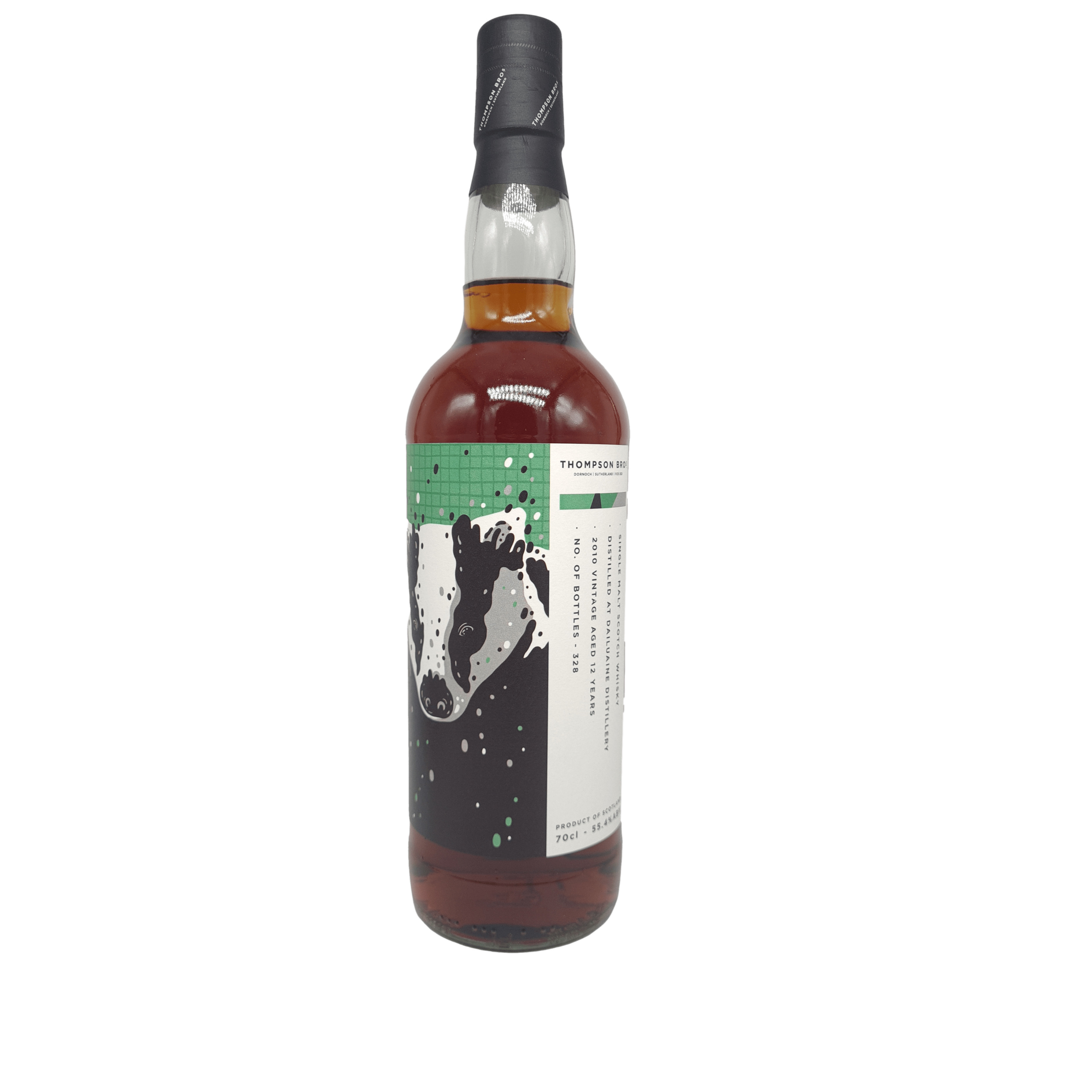
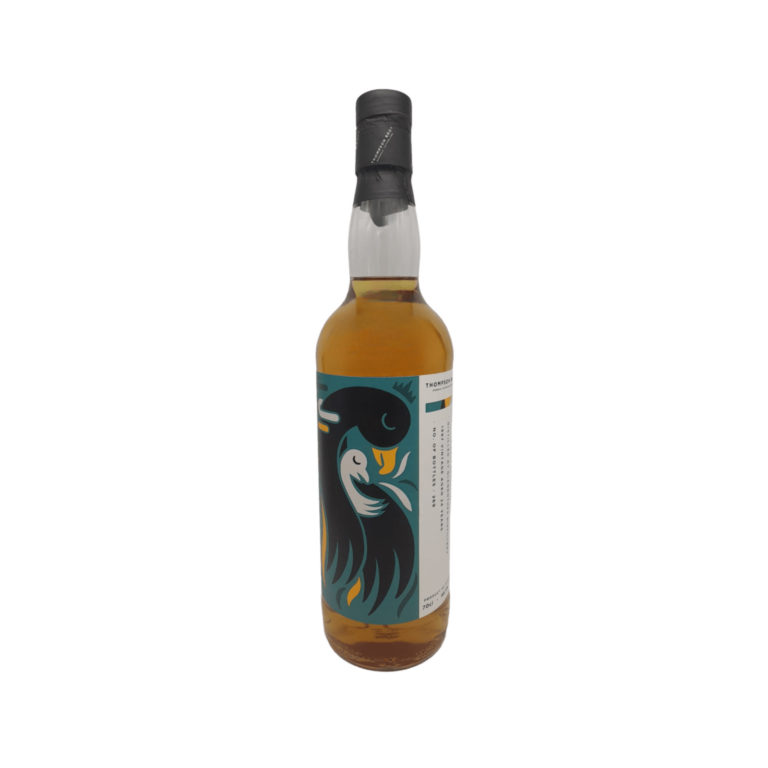
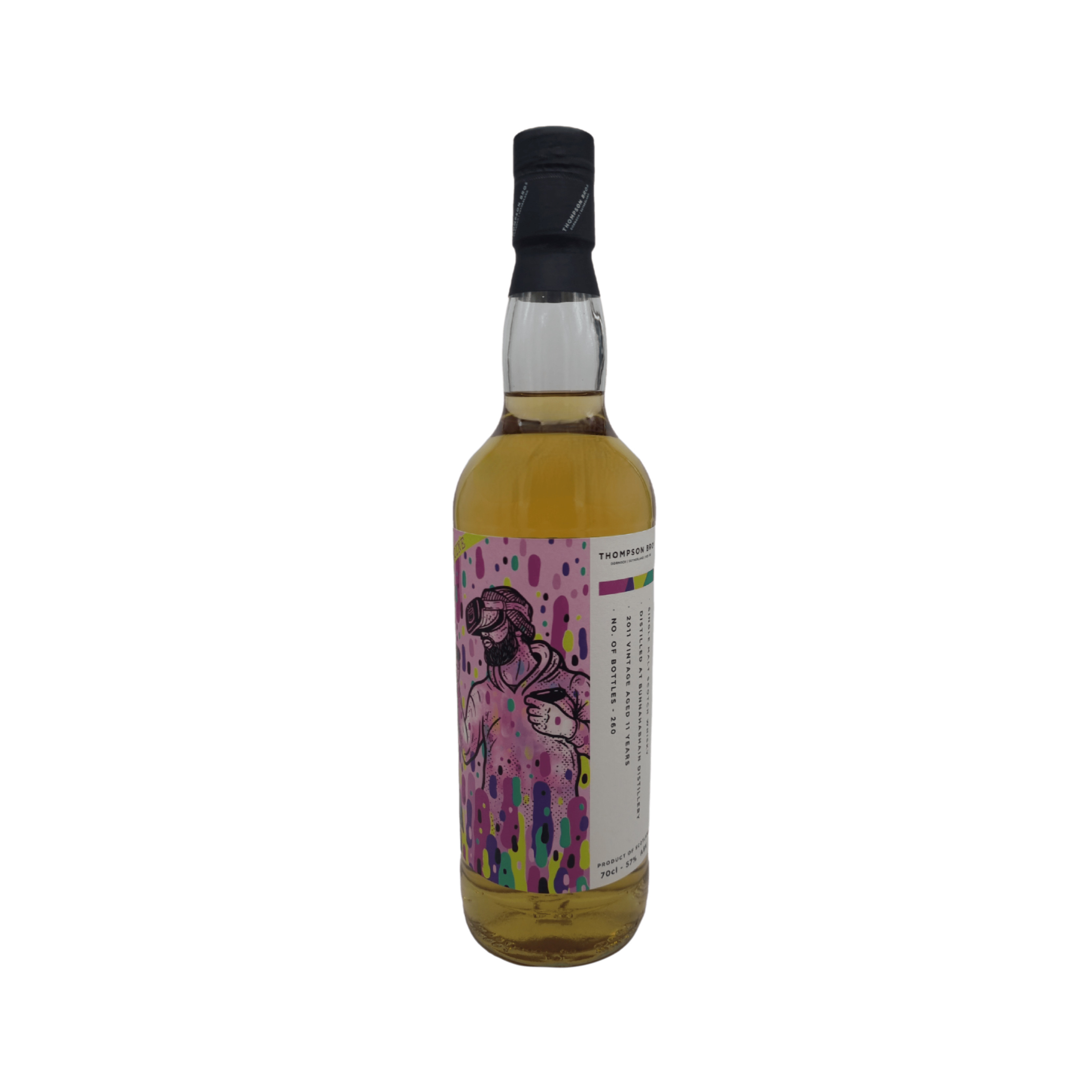
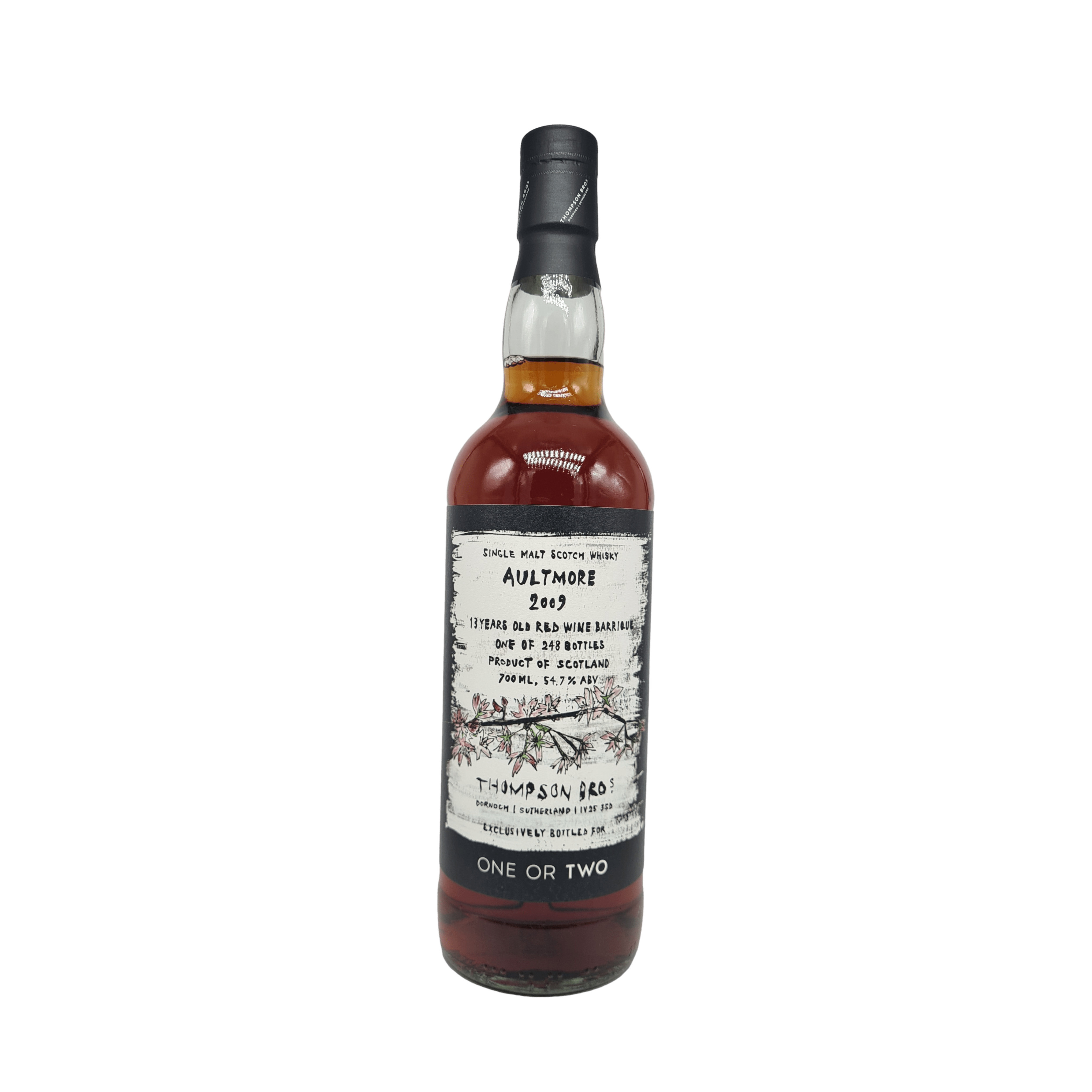
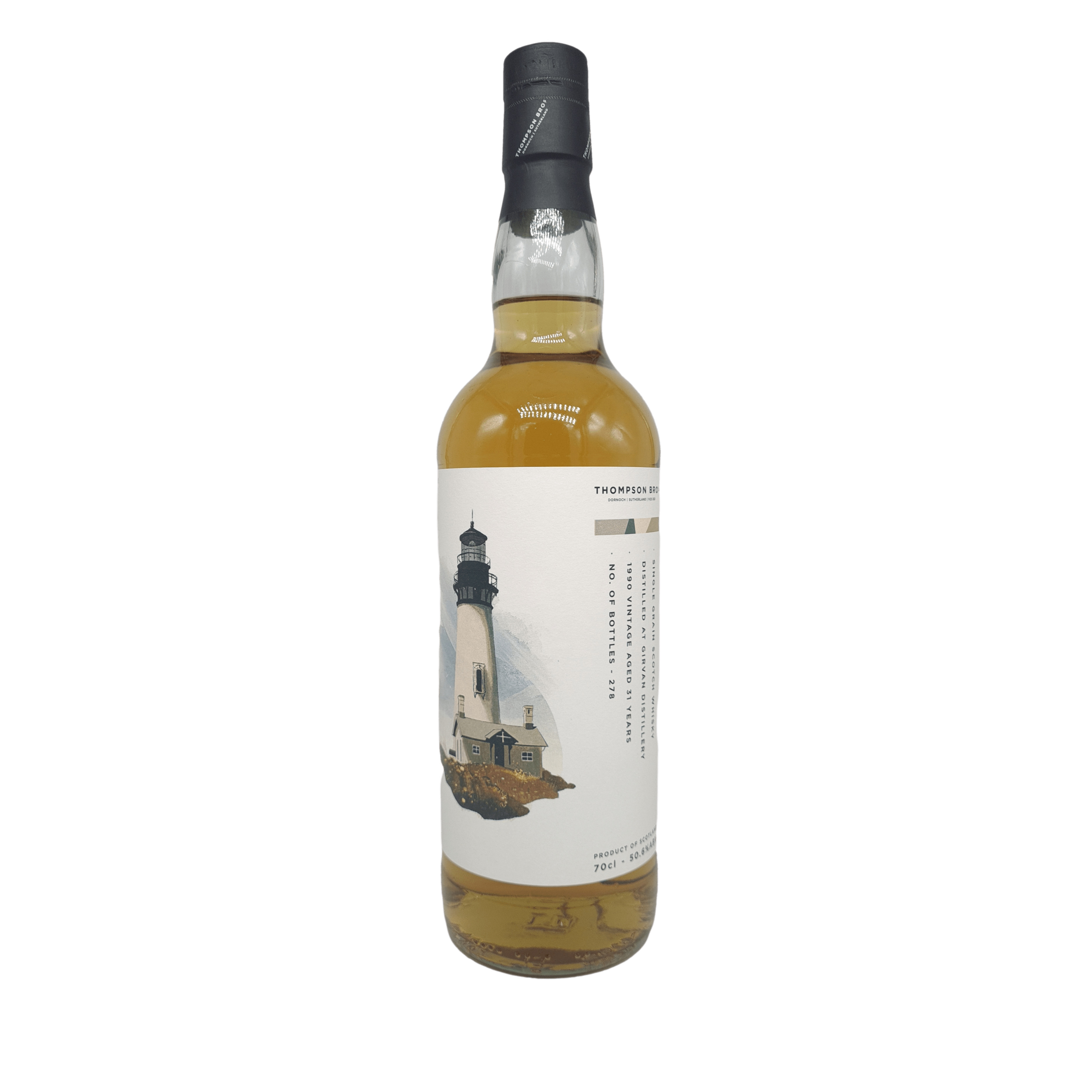
Lastly, what is, generally speaking, your favourite whisky style (cask type, ageing, peated/unpeated etc.)? What’s your dram of choice at the moment and/or your go to drams on a Friday evening?
PT: I try to keep a bottle of Springbank 10 all the time. Normal Bowmore from refilled wood is excellent as well. Kilkerran really good value and excellent distillate. I don’t want to say things that are not accessible to everybody.
Things that we have in the bar Hazelburn 21, Springbank 21, 25 some Chichibu…etc.
ST: There are quite a few Japanese whiskies which are making their ways on my shelf. We opened this Springbank 25 recently which is really good. To be honest our tables are covered in samples every day, we sample whisky all day long, so when I go back home I don’t want anything I need to think too much about.
Our blends are often good go-to drams SRB5 and BSW. All round good and not over complicated.
Official website: https://www.thompsonbrosdistillers.com/

Drams
and more...
Today's drams
- Croftengea 2006 16yo (479 bottles) – 50%
- Girvan 1990 32yo (383 bottles) – 48.7%
- Thompson Bros 6 Year Old Blended – 46%
- Dornoch Single Malt 2017 5yo (1st Fill Octave / 89 bottles, 50cl) – 57.9%
- Dornoch Single Malt 2017 5yo (1st Fill Bourbon Octave / 88 bottles, 50cl) – 58.2%
Dornoch Castle Hotel

One of the best Whisky Bars in Scotland, located in the heart of the Castle that hosts the Hotel.
It has successfully been developed , by Simon & Phil, who over the years have created (and shared) their collection of whiskies.